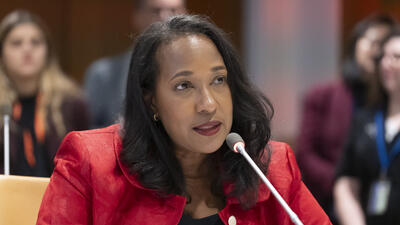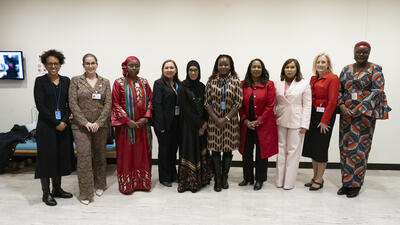
Making public procurement work for women entrepreneurs
New York, the United States of America - ITC Executive Director Pamela Coke-Hamilton delivered the opening remarks for the launch of the Gender-Responsive Public Procurement campaign.
Dear H.E. Mayra Jimenez, Minister of Women, Dominican Republic;
H.E. Arianna Tanca Macchiavello, Minister of Women Affairs and Human Rights, Ecuador;
Honourable Harriette Chiggai, President’s Women’s Rights Advisor, Kenya;
Honourable Fatou Kinteh, Minister of Gender, Children and Social Welfare, The Gambia;
Senator the Honourable Katy Gallagher, Minister for Women, Finance and Public Service, Australia;
H.E. Ms. Carla Serazzi, Ambassador, Director of the Multilateral Chilean Division of Foreign Affairs;
Sarah Hendriks, Director, Policy, Programme and Intergovernmental Division, UN Women;
Greetings and welcome.
I’m honored to be alongside you at the 68th Commission on the Status of Women, and I’m especially grateful to my friend Sima Bahous of UN Women for joining forces with ITC for this campaign, and to our co-organizers, the governments of Kenya, the Dominican Republic, and Ecuador.
Last month we got a sneak preview of the heights that this campaign could reach during the WTO-ITC High-Level Event on Women and Trade in Abu Dhabi, alongside Under-Secretary Claudia Sanhueza from Chile.
The excitement during that “soft launch” event was electric—and gave me hope for what we could see today in New York.
By formally launching this campaign at the CSW, we want to give you a sense of the scale we hope to achieve: that we can make history, together.
It’s the CSW we have to thank for some of the biggest milestones we’ve reached so far in the long journey towards a level playing field for women and men.
Milestones like the Convention on the Elimination of All Forms of Discrimination Against Women, and so many other international conventions that are bringing us closer to an inclusive society.
These weren’t just milestones. They were battles, a true test of wills, and we owe a great debt to the CSW for never being afraid to stand up and say “we can do better.”
ITC is proud to stand in this room, alongside some of the world’s biggest advocates for gender equality, to help contribute to this extraordinary legacy.
Right now, we still live in a world where women make up less than one-third of jobs in science, technology, engineering, and math.
A world where women and girls still face severe risks to their safety when using public transport.
A world where only two drugs have been developed to treat pregnancy-specific conditions… ever.
A world where, according to our friends at the World Economic Forum, we’re unlikely to see global gender parity for another 131 years.
But we also live in a world where women are behind some of the ideas and inventions that we rely on daily—including many that we take for granted.
The life rafts that save countless lives in disasters are because a woman named Maria Beasley figured out how to make them collapsible.
The home security systems that we use to keep our households safe are because of a nurse named Marie Van Britton Brown.
The Wi-Fi, GPS, and Bluetooth technologies that we use daily are because the actress Hedy Lamarr figured out a new technique that prevented radio wave signals from being intercepted in wartime.
We need more Hedy Lamarrs, more Marie Van Britton Browns, and more Maria Beasleys.
And how we get there is by making it possible for more women to become entrepreneurs. They need the chance to build businesses where they can take their innovative ideas and share them with the world—and, critically, that means being able to sell their goods and services to governments.
Today, only 1% of government contracts go to businesses led by women, out of a $11 trillion market. That’s not just a loss to these women entrepreneurs—that’s a loss to our entire society. And it’s a loss we cannot afford.
I want us to picture a world where women and men finally have an equal shot at government contracts—not just for the economic opportunities these hold, but for what these mean for achieving a society premised on inclusion, fairness, prosperity, and dignity.
And it’s the people I see in this room that are already proof positive that this world may not be quite so far off.
Officials from countries like Australia and Canada, who have already made pledges to the campaign. Or from the Dominican Republic and Kenya, The Gambia and Chile, who have all come here to share why gender-responsive public procurement matters for them.
We’ve also received statements of support from Australia, Canada, the Dominican Republic, Ecuador, the European Union, El Salvador, Kenya, Morocco, the International Labor Organization, the United Nations Industrial Development Organization, the Food and Agriculture Organization of the United Nations, the Asian Development Bank, the World Trade Organization, and the World Bank Group. This is extraordinary, and it makes me genuinely hopeful for the future.
But I don’t want us to wait 131 years for global gender parity to become a reality.
That’s why we need many more pledges and more statements of support to help make this parity possible, perhaps even within our generation.
We can’t do it without you—and I have a strong feeling, based on the excitement I see in this room today, that we won’t have to.
The journey starts today. I can’t wait to see where it leads.





